BMP4002: UK Legal System for Business Law - Classifications & Sources
VerifiedAdded on 2023/06/16
|8
|2463
|311
Report
AI Summary
This report provides a comprehensive overview of the UK legal system for business law, focusing on the classifications of law (civil and criminal), the roles of the High Court and Supreme Court, and the sources of law, particularly case law and legislation. It explains the process of making legislation, including delegated legislation, and examines employment law, highlighting statutory duties of employers and actions related to wrongful and unfair dismissal. The report emphasizes the importance of understanding these legal aspects for effective business management and compliance within the UK.
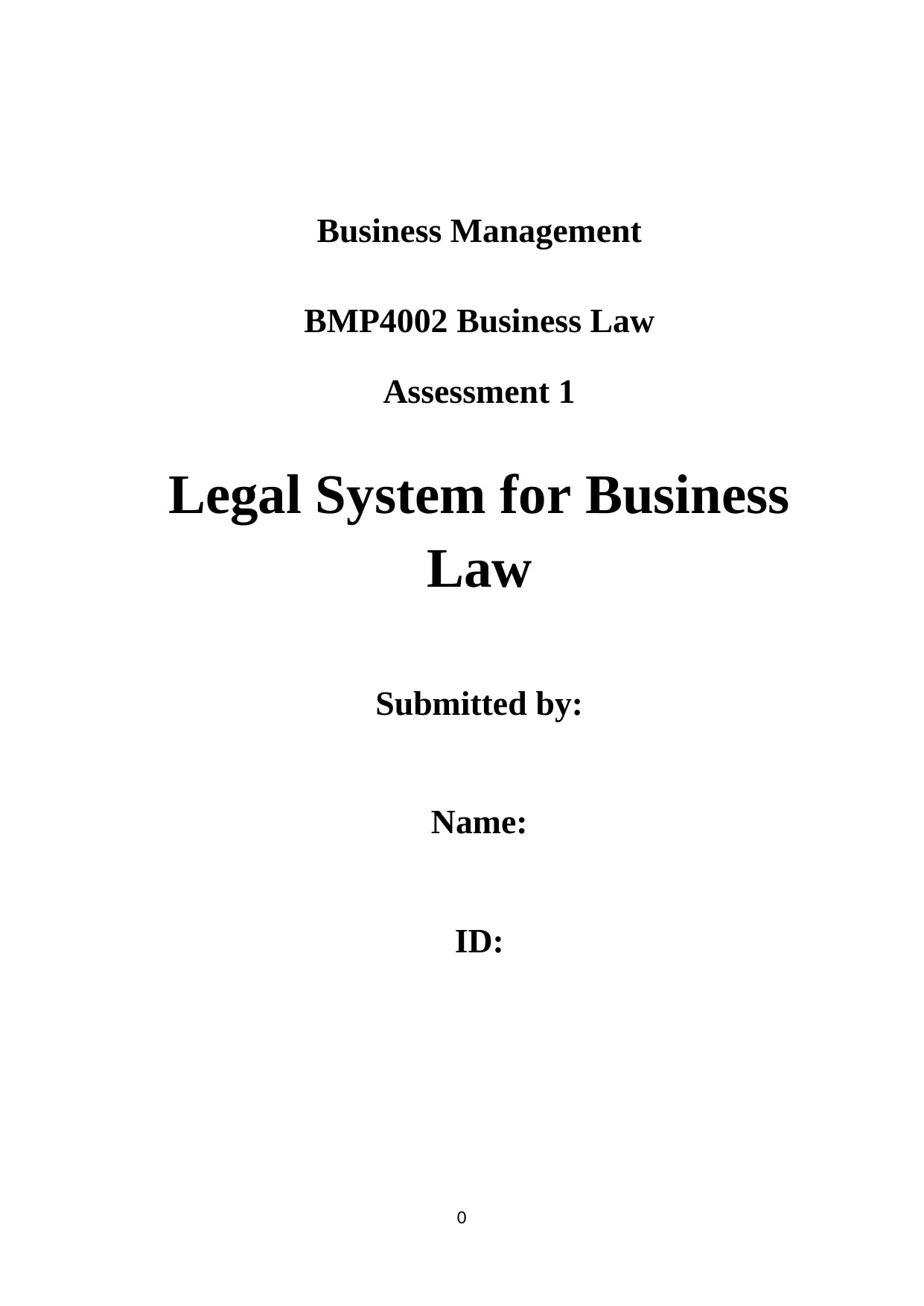
Business Management
BMP4002 Business Law
Assessment 1
Legal System for Business
Law
Submitted by:
Name:
ID:
0
BMP4002 Business Law
Assessment 1
Legal System for Business
Law
Submitted by:
Name:
ID:
0
Paraphrase This Document
Need a fresh take? Get an instant paraphrase of this document with our AI Paraphraser
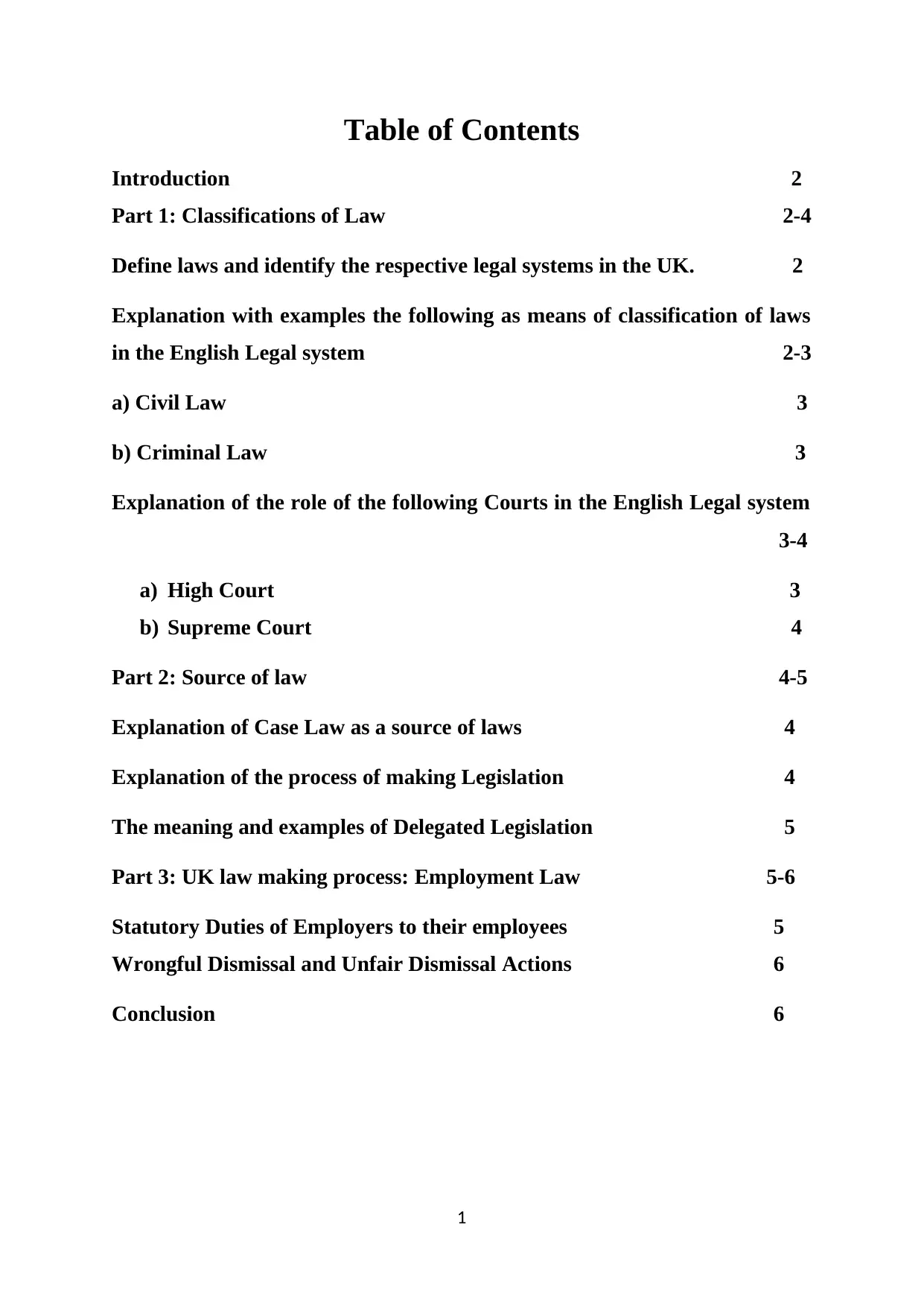
Table of Contents
Introduction 2
Part 1: Classifications of Law 2-4
Define laws and identify the respective legal systems in the UK. 2
Explanation with examples the following as means of classification of laws
in the English Legal system 2-3
a) Civil Law 3
b) Criminal Law 3
Explanation of the role of the following Courts in the English Legal system
3-4
a) High Court 3
b) Supreme Court 4
Part 2: Source of law 4-5
Explanation of Case Law as a source of laws 4
Explanation of the process of making Legislation 4
The meaning and examples of Delegated Legislation 5
Part 3: UK law making process: Employment Law 5-6
Statutory Duties of Employers to their employees 5
Wrongful Dismissal and Unfair Dismissal Actions 6
Conclusion 6
1
Introduction 2
Part 1: Classifications of Law 2-4
Define laws and identify the respective legal systems in the UK. 2
Explanation with examples the following as means of classification of laws
in the English Legal system 2-3
a) Civil Law 3
b) Criminal Law 3
Explanation of the role of the following Courts in the English Legal system
3-4
a) High Court 3
b) Supreme Court 4
Part 2: Source of law 4-5
Explanation of Case Law as a source of laws 4
Explanation of the process of making Legislation 4
The meaning and examples of Delegated Legislation 5
Part 3: UK law making process: Employment Law 5-6
Statutory Duties of Employers to their employees 5
Wrongful Dismissal and Unfair Dismissal Actions 6
Conclusion 6
1
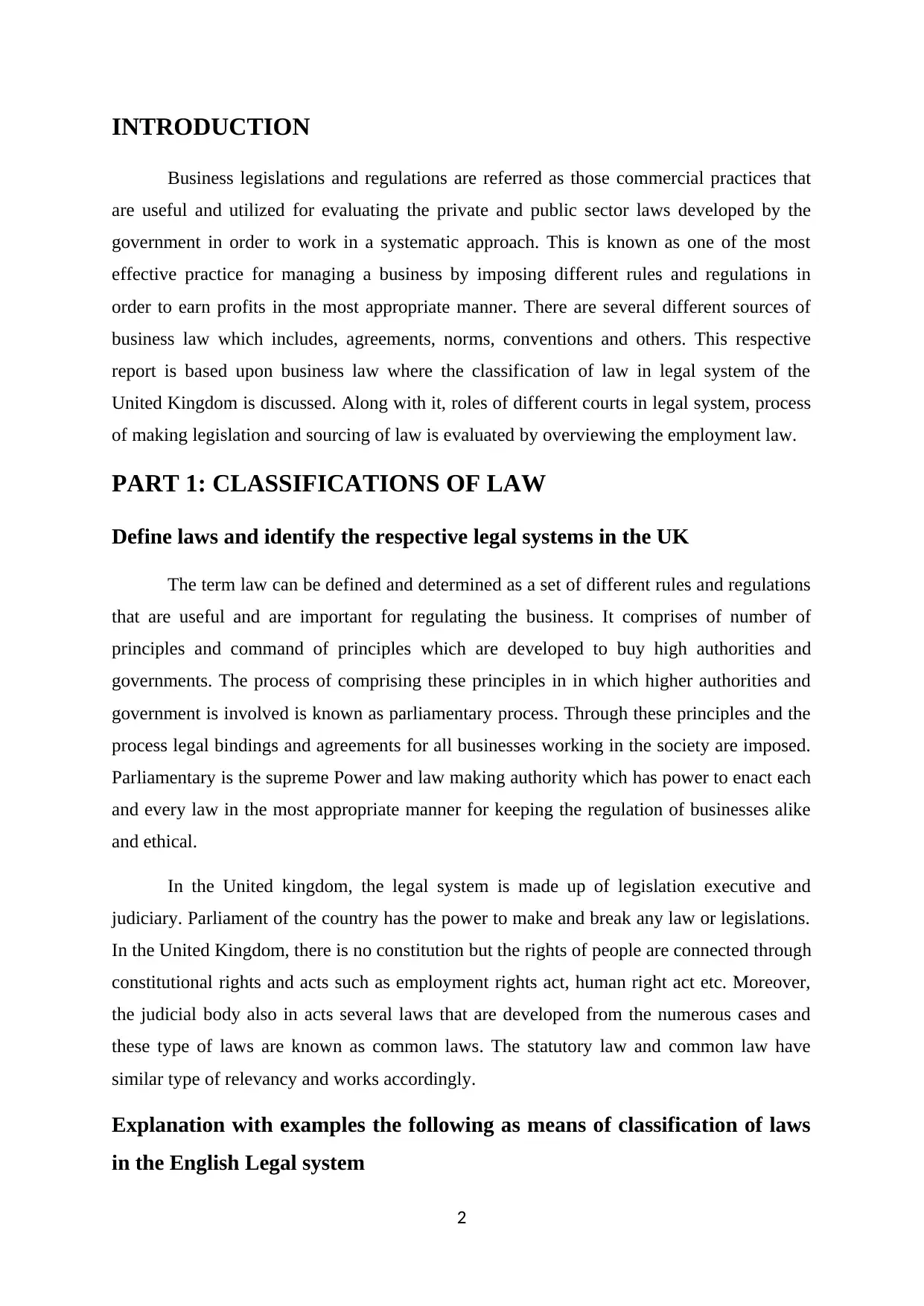
INTRODUCTION
Business legislations and regulations are referred as those commercial practices that
are useful and utilized for evaluating the private and public sector laws developed by the
government in order to work in a systematic approach. This is known as one of the most
effective practice for managing a business by imposing different rules and regulations in
order to earn profits in the most appropriate manner. There are several different sources of
business law which includes, agreements, norms, conventions and others. This respective
report is based upon business law where the classification of law in legal system of the
United Kingdom is discussed. Along with it, roles of different courts in legal system, process
of making legislation and sourcing of law is evaluated by overviewing the employment law.
PART 1: CLASSIFICATIONS OF LAW
Define laws and identify the respective legal systems in the UK
The term law can be defined and determined as a set of different rules and regulations
that are useful and are important for regulating the business. It comprises of number of
principles and command of principles which are developed to buy high authorities and
governments. The process of comprising these principles in in which higher authorities and
government is involved is known as parliamentary process. Through these principles and the
process legal bindings and agreements for all businesses working in the society are imposed.
Parliamentary is the supreme Power and law making authority which has power to enact each
and every law in the most appropriate manner for keeping the regulation of businesses alike
and ethical.
In the United kingdom, the legal system is made up of legislation executive and
judiciary. Parliament of the country has the power to make and break any law or legislations.
In the United Kingdom, there is no constitution but the rights of people are connected through
constitutional rights and acts such as employment rights act, human right act etc. Moreover,
the judicial body also in acts several laws that are developed from the numerous cases and
these type of laws are known as common laws. The statutory law and common law have
similar type of relevancy and works accordingly.
Explanation with examples the following as means of classification of laws
in the English Legal system
2
Business legislations and regulations are referred as those commercial practices that
are useful and utilized for evaluating the private and public sector laws developed by the
government in order to work in a systematic approach. This is known as one of the most
effective practice for managing a business by imposing different rules and regulations in
order to earn profits in the most appropriate manner. There are several different sources of
business law which includes, agreements, norms, conventions and others. This respective
report is based upon business law where the classification of law in legal system of the
United Kingdom is discussed. Along with it, roles of different courts in legal system, process
of making legislation and sourcing of law is evaluated by overviewing the employment law.
PART 1: CLASSIFICATIONS OF LAW
Define laws and identify the respective legal systems in the UK
The term law can be defined and determined as a set of different rules and regulations
that are useful and are important for regulating the business. It comprises of number of
principles and command of principles which are developed to buy high authorities and
governments. The process of comprising these principles in in which higher authorities and
government is involved is known as parliamentary process. Through these principles and the
process legal bindings and agreements for all businesses working in the society are imposed.
Parliamentary is the supreme Power and law making authority which has power to enact each
and every law in the most appropriate manner for keeping the regulation of businesses alike
and ethical.
In the United kingdom, the legal system is made up of legislation executive and
judiciary. Parliament of the country has the power to make and break any law or legislations.
In the United Kingdom, there is no constitution but the rights of people are connected through
constitutional rights and acts such as employment rights act, human right act etc. Moreover,
the judicial body also in acts several laws that are developed from the numerous cases and
these type of laws are known as common laws. The statutory law and common law have
similar type of relevancy and works accordingly.
Explanation with examples the following as means of classification of laws
in the English Legal system
2
⊘ This is a preview!⊘
Do you want full access?
Subscribe today to unlock all pages.

Trusted by 1+ million students worldwide
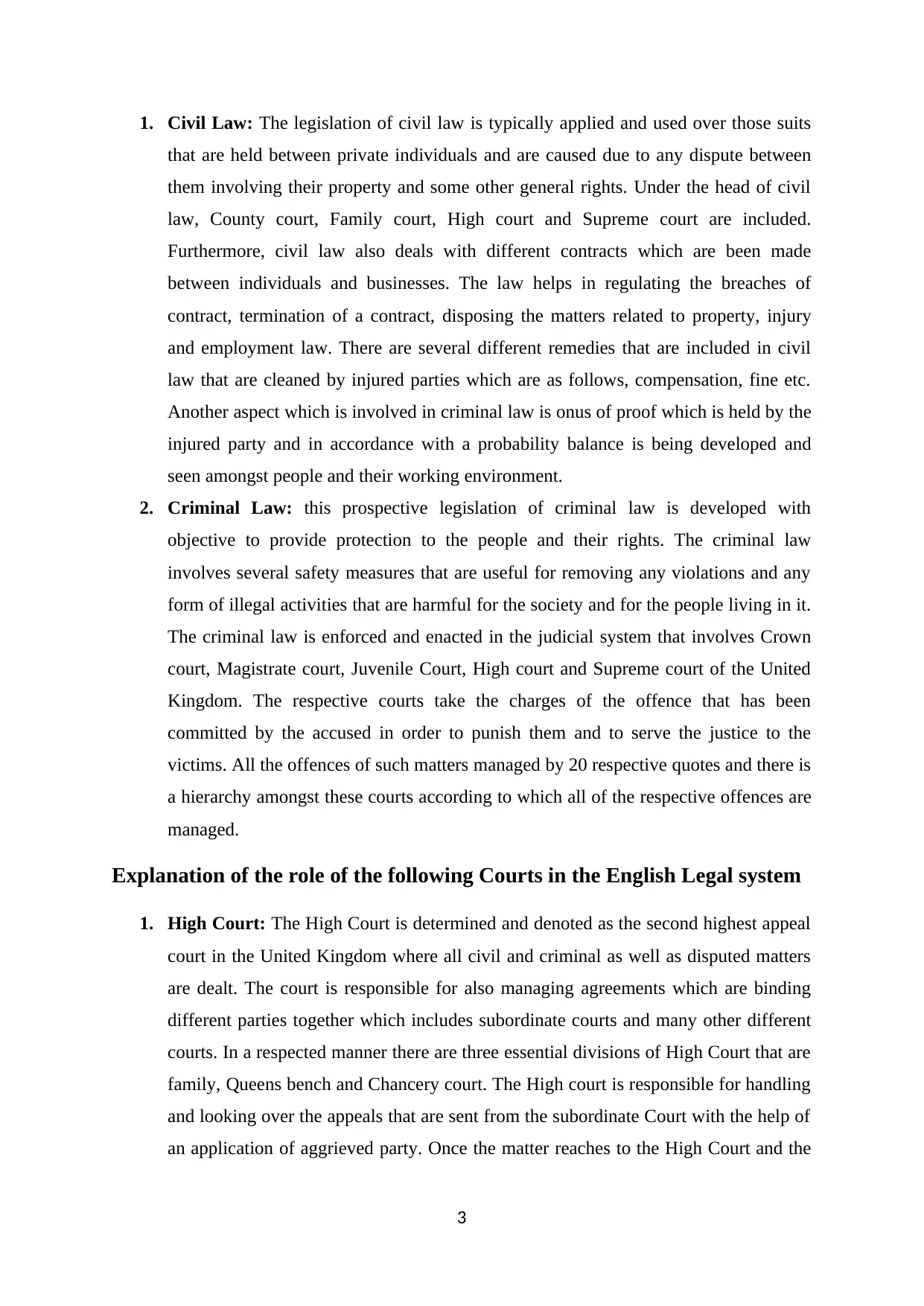
1. Civil Law: The legislation of civil law is typically applied and used over those suits
that are held between private individuals and are caused due to any dispute between
them involving their property and some other general rights. Under the head of civil
law, County court, Family court, High court and Supreme court are included.
Furthermore, civil law also deals with different contracts which are been made
between individuals and businesses. The law helps in regulating the breaches of
contract, termination of a contract, disposing the matters related to property, injury
and employment law. There are several different remedies that are included in civil
law that are cleaned by injured parties which are as follows, compensation, fine etc.
Another aspect which is involved in criminal law is onus of proof which is held by the
injured party and in accordance with a probability balance is being developed and
seen amongst people and their working environment.
2. Criminal Law: this prospective legislation of criminal law is developed with
objective to provide protection to the people and their rights. The criminal law
involves several safety measures that are useful for removing any violations and any
form of illegal activities that are harmful for the society and for the people living in it.
The criminal law is enforced and enacted in the judicial system that involves Crown
court, Magistrate court, Juvenile Court, High court and Supreme court of the United
Kingdom. The respective courts take the charges of the offence that has been
committed by the accused in order to punish them and to serve the justice to the
victims. All the offences of such matters managed by 20 respective quotes and there is
a hierarchy amongst these courts according to which all of the respective offences are
managed.
Explanation of the role of the following Courts in the English Legal system
1. High Court: The High Court is determined and denoted as the second highest appeal
court in the United Kingdom where all civil and criminal as well as disputed matters
are dealt. The court is responsible for also managing agreements which are binding
different parties together which includes subordinate courts and many other different
courts. In a respected manner there are three essential divisions of High Court that are
family, Queens bench and Chancery court. The High court is responsible for handling
and looking over the appeals that are sent from the subordinate Court with the help of
an application of aggrieved party. Once the matter reaches to the High Court and the
3
that are held between private individuals and are caused due to any dispute between
them involving their property and some other general rights. Under the head of civil
law, County court, Family court, High court and Supreme court are included.
Furthermore, civil law also deals with different contracts which are been made
between individuals and businesses. The law helps in regulating the breaches of
contract, termination of a contract, disposing the matters related to property, injury
and employment law. There are several different remedies that are included in civil
law that are cleaned by injured parties which are as follows, compensation, fine etc.
Another aspect which is involved in criminal law is onus of proof which is held by the
injured party and in accordance with a probability balance is being developed and
seen amongst people and their working environment.
2. Criminal Law: this prospective legislation of criminal law is developed with
objective to provide protection to the people and their rights. The criminal law
involves several safety measures that are useful for removing any violations and any
form of illegal activities that are harmful for the society and for the people living in it.
The criminal law is enforced and enacted in the judicial system that involves Crown
court, Magistrate court, Juvenile Court, High court and Supreme court of the United
Kingdom. The respective courts take the charges of the offence that has been
committed by the accused in order to punish them and to serve the justice to the
victims. All the offences of such matters managed by 20 respective quotes and there is
a hierarchy amongst these courts according to which all of the respective offences are
managed.
Explanation of the role of the following Courts in the English Legal system
1. High Court: The High Court is determined and denoted as the second highest appeal
court in the United Kingdom where all civil and criminal as well as disputed matters
are dealt. The court is responsible for also managing agreements which are binding
different parties together which includes subordinate courts and many other different
courts. In a respected manner there are three essential divisions of High Court that are
family, Queens bench and Chancery court. The High court is responsible for handling
and looking over the appeals that are sent from the subordinate Court with the help of
an application of aggrieved party. Once the matter reaches to the High Court and the
3
Paraphrase This Document
Need a fresh take? Get an instant paraphrase of this document with our AI Paraphraser
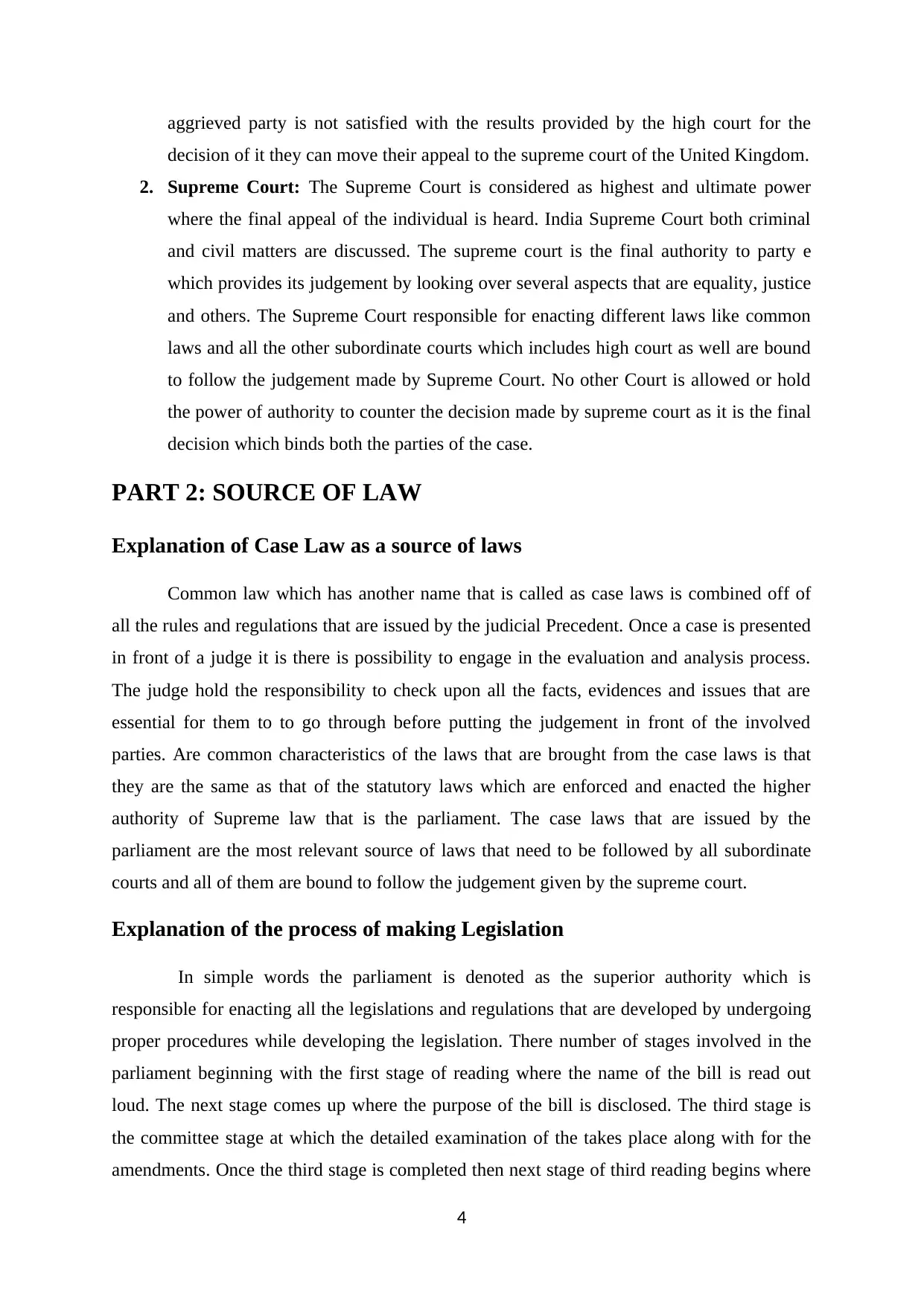
aggrieved party is not satisfied with the results provided by the high court for the
decision of it they can move their appeal to the supreme court of the United Kingdom.
2. Supreme Court: The Supreme Court is considered as highest and ultimate power
where the final appeal of the individual is heard. India Supreme Court both criminal
and civil matters are discussed. The supreme court is the final authority to party e
which provides its judgement by looking over several aspects that are equality, justice
and others. The Supreme Court responsible for enacting different laws like common
laws and all the other subordinate courts which includes high court as well are bound
to follow the judgement made by Supreme Court. No other Court is allowed or hold
the power of authority to counter the decision made by supreme court as it is the final
decision which binds both the parties of the case.
PART 2: SOURCE OF LAW
Explanation of Case Law as a source of laws
Common law which has another name that is called as case laws is combined off of
all the rules and regulations that are issued by the judicial Precedent. Once a case is presented
in front of a judge it is there is possibility to engage in the evaluation and analysis process.
The judge hold the responsibility to check upon all the facts, evidences and issues that are
essential for them to to go through before putting the judgement in front of the involved
parties. Are common characteristics of the laws that are brought from the case laws is that
they are the same as that of the statutory laws which are enforced and enacted the higher
authority of Supreme law that is the parliament. The case laws that are issued by the
parliament are the most relevant source of laws that need to be followed by all subordinate
courts and all of them are bound to follow the judgement given by the supreme court.
Explanation of the process of making Legislation
In simple words the parliament is denoted as the superior authority which is
responsible for enacting all the legislations and regulations that are developed by undergoing
proper procedures while developing the legislation. There number of stages involved in the
parliament beginning with the first stage of reading where the name of the bill is read out
loud. The next stage comes up where the purpose of the bill is disclosed. The third stage is
the committee stage at which the detailed examination of the takes place along with for the
amendments. Once the third stage is completed then next stage of third reading begins where
4
decision of it they can move their appeal to the supreme court of the United Kingdom.
2. Supreme Court: The Supreme Court is considered as highest and ultimate power
where the final appeal of the individual is heard. India Supreme Court both criminal
and civil matters are discussed. The supreme court is the final authority to party e
which provides its judgement by looking over several aspects that are equality, justice
and others. The Supreme Court responsible for enacting different laws like common
laws and all the other subordinate courts which includes high court as well are bound
to follow the judgement made by Supreme Court. No other Court is allowed or hold
the power of authority to counter the decision made by supreme court as it is the final
decision which binds both the parties of the case.
PART 2: SOURCE OF LAW
Explanation of Case Law as a source of laws
Common law which has another name that is called as case laws is combined off of
all the rules and regulations that are issued by the judicial Precedent. Once a case is presented
in front of a judge it is there is possibility to engage in the evaluation and analysis process.
The judge hold the responsibility to check upon all the facts, evidences and issues that are
essential for them to to go through before putting the judgement in front of the involved
parties. Are common characteristics of the laws that are brought from the case laws is that
they are the same as that of the statutory laws which are enforced and enacted the higher
authority of Supreme law that is the parliament. The case laws that are issued by the
parliament are the most relevant source of laws that need to be followed by all subordinate
courts and all of them are bound to follow the judgement given by the supreme court.
Explanation of the process of making Legislation
In simple words the parliament is denoted as the superior authority which is
responsible for enacting all the legislations and regulations that are developed by undergoing
proper procedures while developing the legislation. There number of stages involved in the
parliament beginning with the first stage of reading where the name of the bill is read out
loud. The next stage comes up where the purpose of the bill is disclosed. The third stage is
the committee stage at which the detailed examination of the takes place along with for the
amendments. Once the third stage is completed then next stage of third reading begins where
4
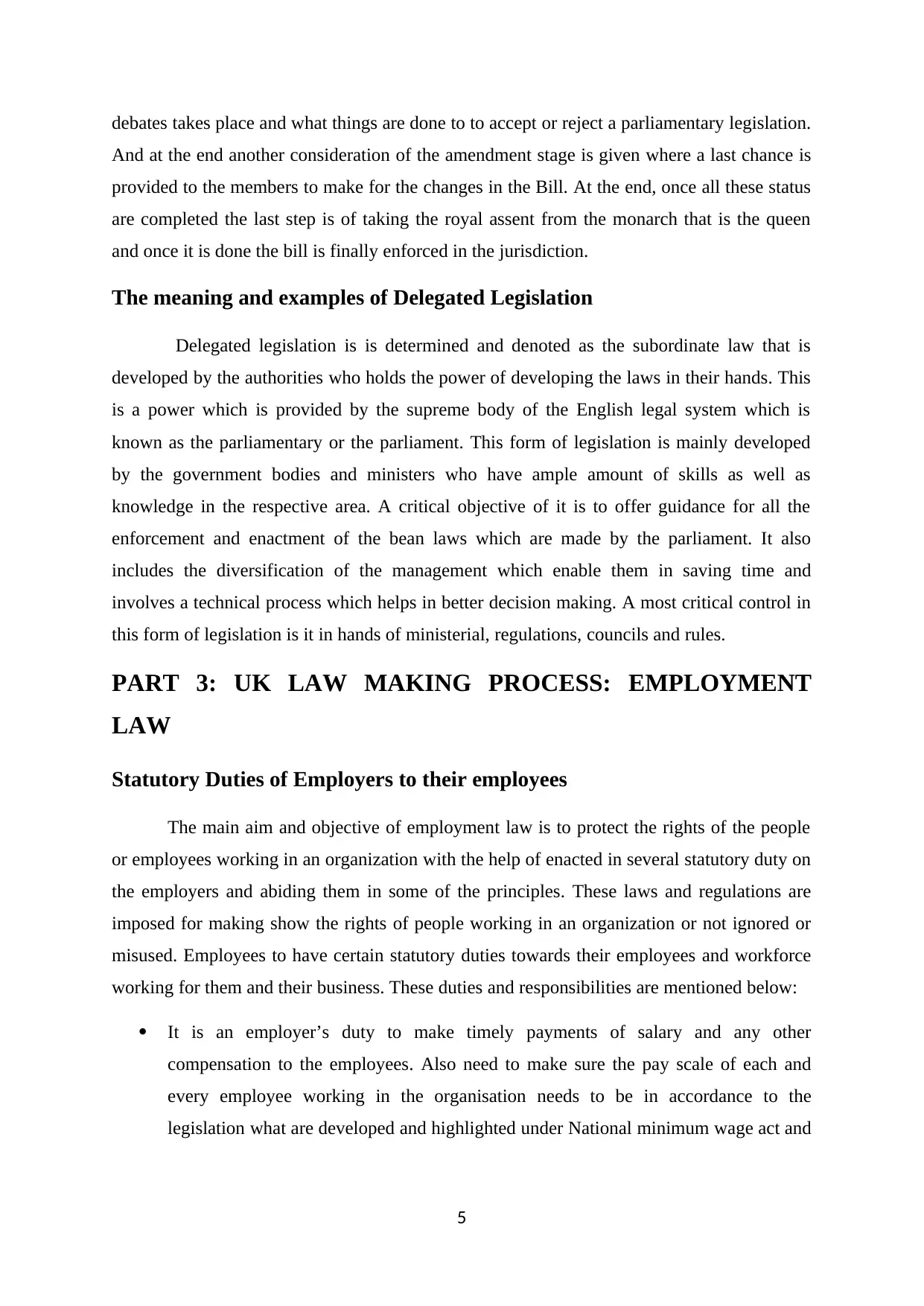
debates takes place and what things are done to to accept or reject a parliamentary legislation.
And at the end another consideration of the amendment stage is given where a last chance is
provided to the members to make for the changes in the Bill. At the end, once all these status
are completed the last step is of taking the royal assent from the monarch that is the queen
and once it is done the bill is finally enforced in the jurisdiction.
The meaning and examples of Delegated Legislation
Delegated legislation is is determined and denoted as the subordinate law that is
developed by the authorities who holds the power of developing the laws in their hands. This
is a power which is provided by the supreme body of the English legal system which is
known as the parliamentary or the parliament. This form of legislation is mainly developed
by the government bodies and ministers who have ample amount of skills as well as
knowledge in the respective area. A critical objective of it is to offer guidance for all the
enforcement and enactment of the bean laws which are made by the parliament. It also
includes the diversification of the management which enable them in saving time and
involves a technical process which helps in better decision making. A most critical control in
this form of legislation is it in hands of ministerial, regulations, councils and rules.
PART 3: UK LAW MAKING PROCESS: EMPLOYMENT
LAW
Statutory Duties of Employers to their employees
The main aim and objective of employment law is to protect the rights of the people
or employees working in an organization with the help of enacted in several statutory duty on
the employers and abiding them in some of the principles. These laws and regulations are
imposed for making show the rights of people working in an organization or not ignored or
misused. Employees to have certain statutory duties towards their employees and workforce
working for them and their business. These duties and responsibilities are mentioned below:
It is an employer’s duty to make timely payments of salary and any other
compensation to the employees. Also need to make sure the pay scale of each and
every employee working in the organisation needs to be in accordance to the
legislation what are developed and highlighted under National minimum wage act and
5
And at the end another consideration of the amendment stage is given where a last chance is
provided to the members to make for the changes in the Bill. At the end, once all these status
are completed the last step is of taking the royal assent from the monarch that is the queen
and once it is done the bill is finally enforced in the jurisdiction.
The meaning and examples of Delegated Legislation
Delegated legislation is is determined and denoted as the subordinate law that is
developed by the authorities who holds the power of developing the laws in their hands. This
is a power which is provided by the supreme body of the English legal system which is
known as the parliamentary or the parliament. This form of legislation is mainly developed
by the government bodies and ministers who have ample amount of skills as well as
knowledge in the respective area. A critical objective of it is to offer guidance for all the
enforcement and enactment of the bean laws which are made by the parliament. It also
includes the diversification of the management which enable them in saving time and
involves a technical process which helps in better decision making. A most critical control in
this form of legislation is it in hands of ministerial, regulations, councils and rules.
PART 3: UK LAW MAKING PROCESS: EMPLOYMENT
LAW
Statutory Duties of Employers to their employees
The main aim and objective of employment law is to protect the rights of the people
or employees working in an organization with the help of enacted in several statutory duty on
the employers and abiding them in some of the principles. These laws and regulations are
imposed for making show the rights of people working in an organization or not ignored or
misused. Employees to have certain statutory duties towards their employees and workforce
working for them and their business. These duties and responsibilities are mentioned below:
It is an employer’s duty to make timely payments of salary and any other
compensation to the employees. Also need to make sure the pay scale of each and
every employee working in the organisation needs to be in accordance to the
legislation what are developed and highlighted under National minimum wage act and
5
⊘ This is a preview!⊘
Do you want full access?
Subscribe today to unlock all pages.

Trusted by 1+ million students worldwide
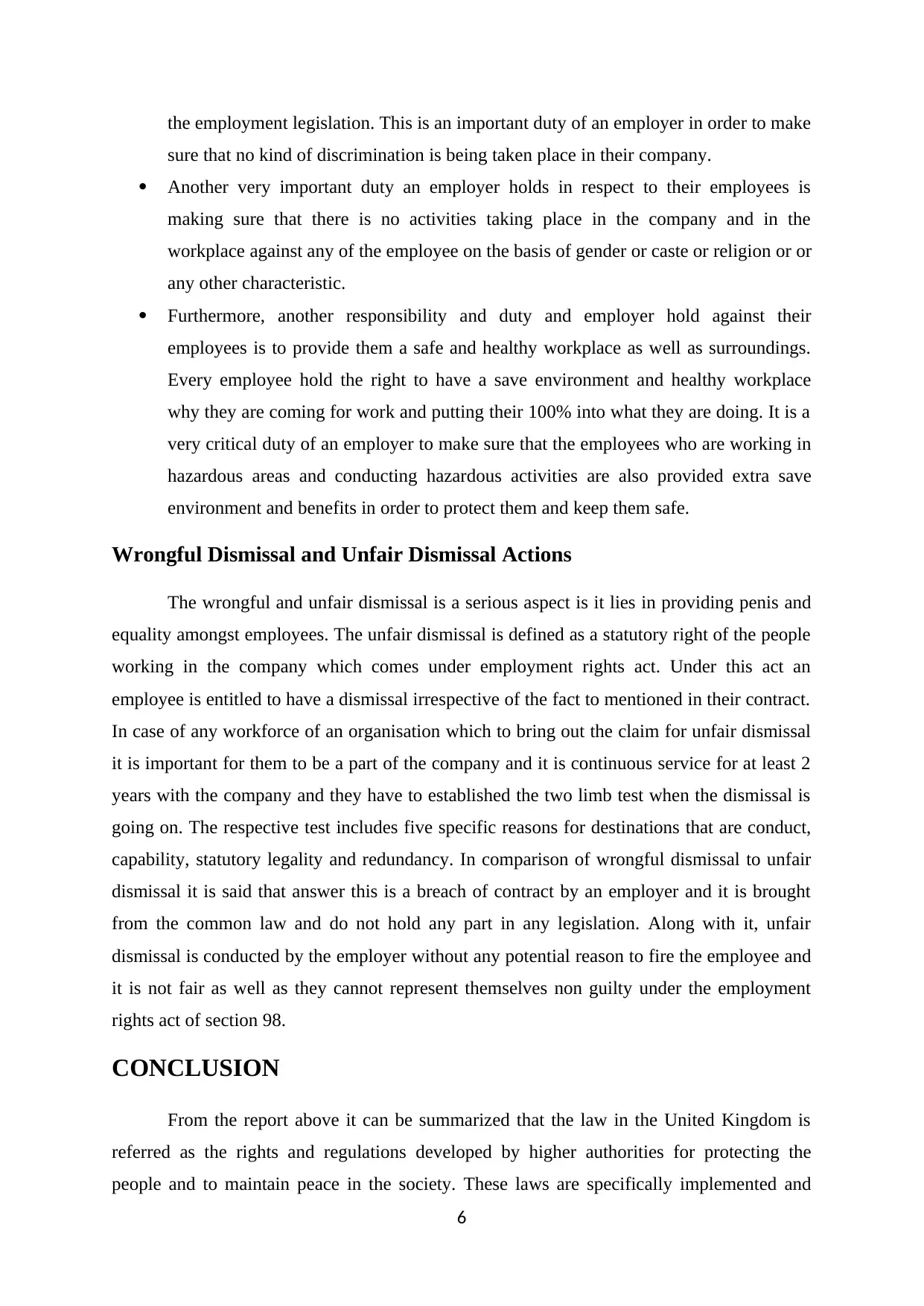
the employment legislation. This is an important duty of an employer in order to make
sure that no kind of discrimination is being taken place in their company.
Another very important duty an employer holds in respect to their employees is
making sure that there is no activities taking place in the company and in the
workplace against any of the employee on the basis of gender or caste or religion or or
any other characteristic.
Furthermore, another responsibility and duty and employer hold against their
employees is to provide them a safe and healthy workplace as well as surroundings.
Every employee hold the right to have a save environment and healthy workplace
why they are coming for work and putting their 100% into what they are doing. It is a
very critical duty of an employer to make sure that the employees who are working in
hazardous areas and conducting hazardous activities are also provided extra save
environment and benefits in order to protect them and keep them safe.
Wrongful Dismissal and Unfair Dismissal Actions
The wrongful and unfair dismissal is a serious aspect is it lies in providing penis and
equality amongst employees. The unfair dismissal is defined as a statutory right of the people
working in the company which comes under employment rights act. Under this act an
employee is entitled to have a dismissal irrespective of the fact to mentioned in their contract.
In case of any workforce of an organisation which to bring out the claim for unfair dismissal
it is important for them to be a part of the company and it is continuous service for at least 2
years with the company and they have to established the two limb test when the dismissal is
going on. The respective test includes five specific reasons for destinations that are conduct,
capability, statutory legality and redundancy. In comparison of wrongful dismissal to unfair
dismissal it is said that answer this is a breach of contract by an employer and it is brought
from the common law and do not hold any part in any legislation. Along with it, unfair
dismissal is conducted by the employer without any potential reason to fire the employee and
it is not fair as well as they cannot represent themselves non guilty under the employment
rights act of section 98.
CONCLUSION
From the report above it can be summarized that the law in the United Kingdom is
referred as the rights and regulations developed by higher authorities for protecting the
people and to maintain peace in the society. These laws are specifically implemented and
6
sure that no kind of discrimination is being taken place in their company.
Another very important duty an employer holds in respect to their employees is
making sure that there is no activities taking place in the company and in the
workplace against any of the employee on the basis of gender or caste or religion or or
any other characteristic.
Furthermore, another responsibility and duty and employer hold against their
employees is to provide them a safe and healthy workplace as well as surroundings.
Every employee hold the right to have a save environment and healthy workplace
why they are coming for work and putting their 100% into what they are doing. It is a
very critical duty of an employer to make sure that the employees who are working in
hazardous areas and conducting hazardous activities are also provided extra save
environment and benefits in order to protect them and keep them safe.
Wrongful Dismissal and Unfair Dismissal Actions
The wrongful and unfair dismissal is a serious aspect is it lies in providing penis and
equality amongst employees. The unfair dismissal is defined as a statutory right of the people
working in the company which comes under employment rights act. Under this act an
employee is entitled to have a dismissal irrespective of the fact to mentioned in their contract.
In case of any workforce of an organisation which to bring out the claim for unfair dismissal
it is important for them to be a part of the company and it is continuous service for at least 2
years with the company and they have to established the two limb test when the dismissal is
going on. The respective test includes five specific reasons for destinations that are conduct,
capability, statutory legality and redundancy. In comparison of wrongful dismissal to unfair
dismissal it is said that answer this is a breach of contract by an employer and it is brought
from the common law and do not hold any part in any legislation. Along with it, unfair
dismissal is conducted by the employer without any potential reason to fire the employee and
it is not fair as well as they cannot represent themselves non guilty under the employment
rights act of section 98.
CONCLUSION
From the report above it can be summarized that the law in the United Kingdom is
referred as the rights and regulations developed by higher authorities for protecting the
people and to maintain peace in the society. These laws are specifically implemented and
6
Paraphrase This Document
Need a fresh take? Get an instant paraphrase of this document with our AI Paraphraser
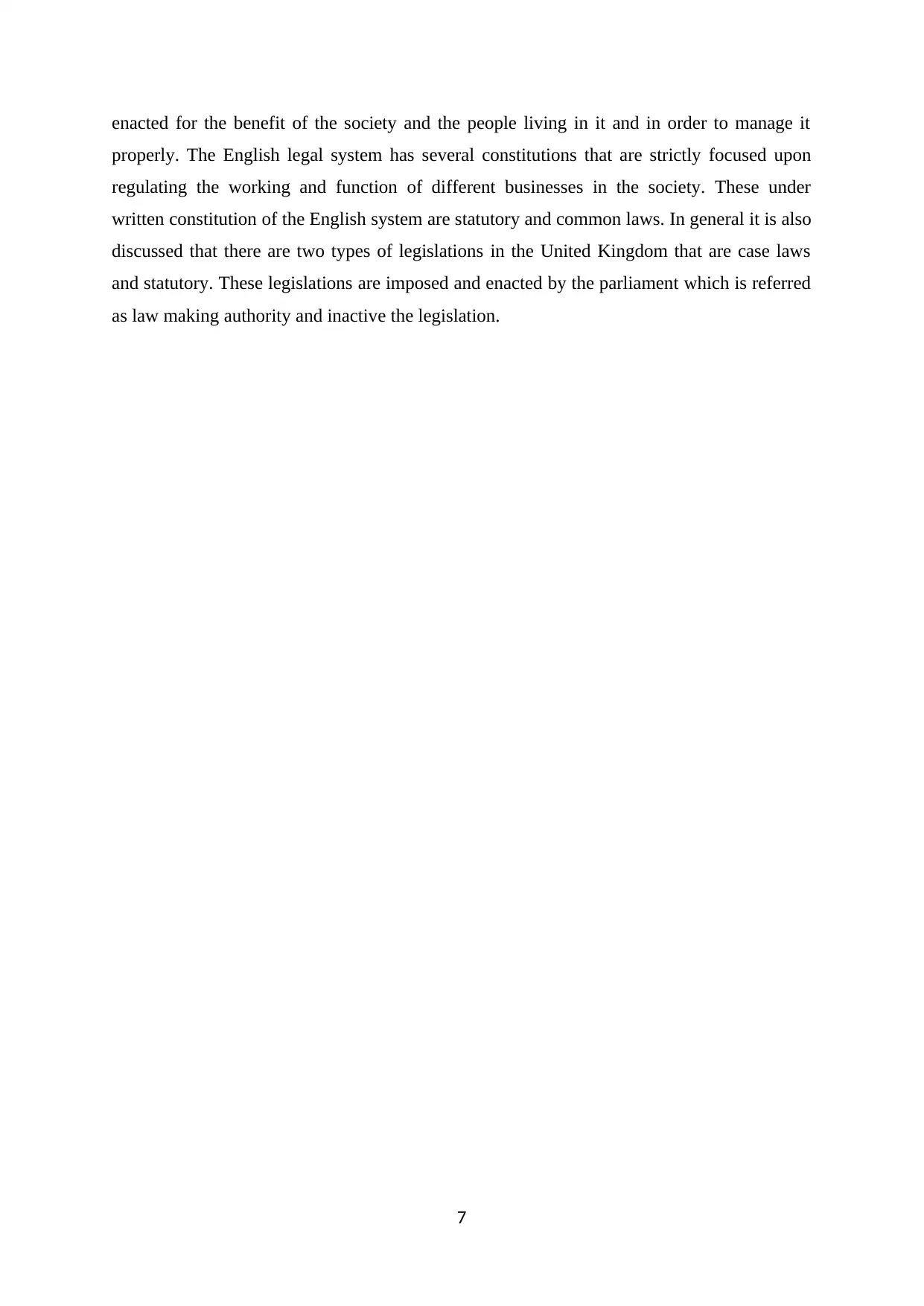
enacted for the benefit of the society and the people living in it and in order to manage it
properly. The English legal system has several constitutions that are strictly focused upon
regulating the working and function of different businesses in the society. These under
written constitution of the English system are statutory and common laws. In general it is also
discussed that there are two types of legislations in the United Kingdom that are case laws
and statutory. These legislations are imposed and enacted by the parliament which is referred
as law making authority and inactive the legislation.
7
properly. The English legal system has several constitutions that are strictly focused upon
regulating the working and function of different businesses in the society. These under
written constitution of the English system are statutory and common laws. In general it is also
discussed that there are two types of legislations in the United Kingdom that are case laws
and statutory. These legislations are imposed and enacted by the parliament which is referred
as law making authority and inactive the legislation.
7
1 out of 8
Related Documents
Your All-in-One AI-Powered Toolkit for Academic Success.
+13062052269
info@desklib.com
Available 24*7 on WhatsApp / Email
![[object Object]](/_next/static/media/star-bottom.7253800d.svg)
Unlock your academic potential
Copyright © 2020–2026 A2Z Services. All Rights Reserved. Developed and managed by ZUCOL.



